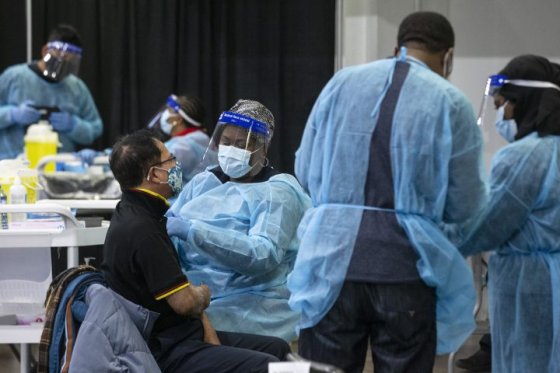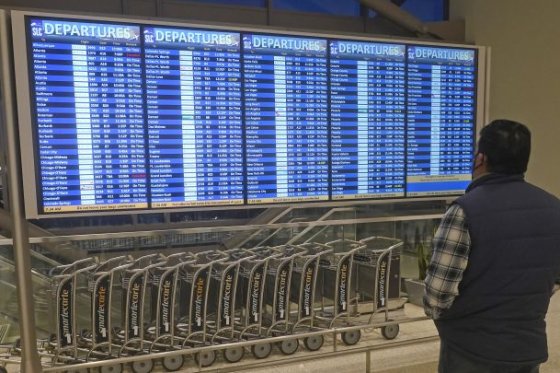| |
| Newsletter continues after sponsor message |
|
| Here are a few highlights from Bonior’s answers to your questions on dealing with holiday anxiety:
💉 On your unvaccinated family member
You have a right to speak up. "You shouldn't have to sacrifice your own health in order to get along in this family,” says Bonior. You don’t have to put yourself in situations that feel unsafe for the sake of avoiding drama. Instead, draw clear boundaries with family members about health and safety, and if other people can’t respect them, it’s okay to disinvite or opt out.
💔 On hostile in-laws
Bonior says for better or worse, the holidays often present couples with the opportunity to work on being a united front. If your loved ones are creating a toxic environment for your partner, she says beware that toxicity can bleed into your relationship if not dealt with. It’s incumbent on you to offer protection, and to work together to decide what that looks like.
💸 On excessive holiday spending
Gift-giving is so wrapped up into the holidays that some people have a hard time envisioning the season without it. But if you're on a tight budget, Bonior says you shouldn’t have to go into debt to keep your relatives happy. Instead, she says, have an open conversation about why gifting is important, and then get creative! Could you set dollar limits, do a White Elephant exchange, or plan for homemade gifts only?
😔 On loneliness
Not everyone has someone to go home to – that can be hard to deal with anytime, but especially during the peak season of gathering. Bonior advises you don’t have to put on a brave face. Instead, she suggests, "Let yourself say, 'This is a really tough holiday for me, and maybe, I kind of want to tune out certain aspects of the holiday altogether.'" But remember, community is made in a lot of different ways. Bonior says reaching out to friends or volunteering your time can help you get out of your head. |
|
Wishing you peace and time well spent friends, whatever that looks like for you.
–Andee Tagle, Life Kit producer
|
|
Episodes that moved us in 2021 |
|
Thanks for sticking with us! As an extra treat for you, dear reader, members of the Life Kit team shared what episodes we've learned from this year:
Feedback is a gift. Good feedback that is. As someone who leads a team, I know feedback is crucial for growth. But it can be super uncomfortable to give it. What if I say the wrong thing? What if I seem mad when I'm not? This episode featuring Massella Dukuly, the director of learning and development at LifeLabs Learning, gave me the perfect feedback roadmap. The key is to be specific and direct. I was surprised how much people started thanking me for feedback once I followed Dukuly's tips.
–Meghan Keane, managing editor
An apology can either hurt or heal a relationship and the ability to deliver a solid one is something I think we could all use. Being able to recognize where we have caused harm or messed up is a practice in humility. It's easiest to be defensive, to believe ourselves right. But to bend towards understanding, towards another person, takes practice. Psychologist Harriet Lerner says it's tempting to listen for what you don't agree with — to poke holes in whatever the hurt-party says. But defensiveness won't create closeness. Next time, try listening for what you can relate to instead of what you want to refute. Normalize apologies ❤️
–Clare Schneider, associate producer
Hosting doesn’t come naturally to me. I’m a bad cook, I never remember to turn on music, and I can’t stop apologizing about stuff. But, I LOVE gathering. So it was a relief to hear Priya Parker, author of The Art of Gathering, explain that hosting isn’t about the food or the decorations — it’s about the purpose. If you can figure out why you want to get people together, and explain it to them before they arrive, everything else flows from there. This tip gave me the confidence to start hosting a monthly book club with some friends who are avid readers. We know exactly why we’re getting together: to talk about THAT ENDING! And all my insecurities about the tear-apart cookies and questionable wine? Not even a footnote.
–Beck Harlan, visuals editor
For marginalized or more junior employees, it's not always easy to speak up in work meetings. Even when you do share your ideas, it's never clear whether your coworkers are really listening. One tip that has changed my experience at work is the amplification strategy from Tina Opie, a visiting scholar at Harvard Business School and the head of Opie Consulting Group. Here's how it works: you coordinate with your coworkers before a meeting that you will "amplify" each other's ideas. So during the call, when you finally speak up, you have allies who are there to support your initiative! Not only did this work for me and my work friends, but it also allowed me to connect with and better support my coworkers 😊
–Janet W. Lee, production-editorial assistant
|
Thanks for reading! Look out here for next week's episodes on: 🍷 Giving up alcohol | 🥂 Writing a toast | 🚶 Exercising |
|
Stream your local NPR station. |
|
| Visit NPR.org to find your local station stream. |
|
|
| |
|
|
|
| | | What do you think of today's email? We'd love to hear your thoughts, questions and feedback: LifeKit@npr.org |
|
|
|
| | Enjoying this newsletter? Forward to a friend! They can sign up here. |
|
|
|
|
|
| | | You received this message because you're subscribed to Life Kit emails. This email was sent by National Public Radio, Inc., 1111 North Capitol Street NE, Washington, DC 20002
Unsubscribe | Privacy Policy |  |
| |
|
|
|
| |


























